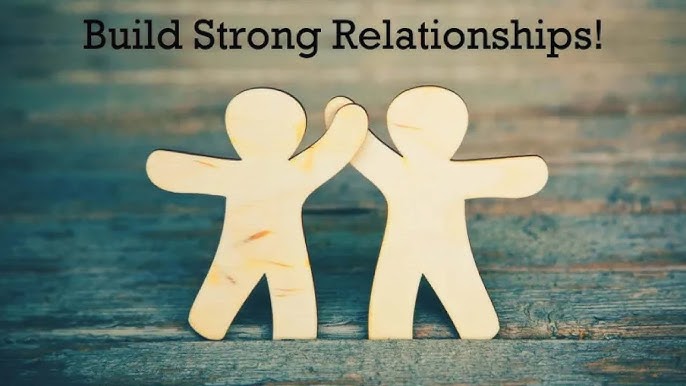Build a strong relationship is a rewarding yet ongoing process that requires care, understanding, and effort from both partners. Unlike falling in love, which may feel sudden and effortless, creating a resilient and lasting bond takes conscious actions that nurture trust, respect, and intimacy over time.
Whether newly dating or in a long-term partnership, couples can apply foundational strategies to strengthen their connection and navigate life’s challenges together. This article explores expert tips on how to build a strong relationship, emphasizing communication, emotional safety, shared goals, and mutual support.
Tip 1: Communicate Openly and Honestly
Clear communication is the bedrock of any strong relationship. It involves not only expressing your feelings and thoughts but also actively listening to your partner without judgment or interruption. Open dialogue ensures both partners feel heard and valued, preventing misunderstandings that can erode trust.
Experts recommend focusing on your own feelings when discussing issues. Using “I” statements such as “I feel…” rather than “You never…” lowers defensiveness and fosters cooperation. Setting aside regular time for meaningful conversations—even about small things—strengthens emotional intimacy.
How to Improve Communication
-
Practice active listening by summarizing your partner’s points before responding.
-
Avoid interrupting or planning your rebuttal while they speak.
-
Share your vulnerabilities to deepen trust.
-
Address conflicts promptly with calm and kindness.
Consistent, honest communication creates a safe space for both partners to express themselves and grow together.
Tip 2: Prioritize Quality Time and Shared Experiences
Strong relationships are nurtured through shared moments that build memories and connection. In busy lives, prioritizing quality time—even small daily rituals like meals or walks—signals that the relationship is a priority.
Engaging in activities together, from hobbies to travel or simply relaxing, helps couples strengthen their bond beyond routine. Novel or fun experiences can reignite passion and foster joy.
Ways to Cultivate Quality Time
-
Schedule regular date nights free from distractions.
-
Share hobbies or learn new skills together.
-
Create traditions or rituals, such as morning coffee or weekly check-ins.
Spending intentional time builds intimacy and resilience, helping couples weather stresses as a united team.
Tip 3: Show Appreciation and Practice Gratitude
Expressing appreciation regularly reinforces love and respect within a relationship. Simple acknowledgments of your partner’s positive actions or qualities cultivate positive feelings and reduce resentment.
Research finds that both perceived gratitude (feeling appreciated) and expressed gratitude (expressing thanks) improve relationship satisfaction. Small acts such as thank you notes, compliments, or thoughtful gestures remind partners they are valued.
Tips for Showing Appreciation
-
Verbally thank your partner often.
-
Spotlight their efforts and strengths.
-
Surprise them with small acts of kindness.
-
Celebrate milestones and successes together.
Fostering a culture of gratitude sustains affection and happiness.
Tip 4: Build Trust Through Consistency and Transparency
Trust is foundational to a strong relationship. It develops over time through consistent, honest actions that demonstrate dependability and integrity. Keeping promises, admitting mistakes, and being transparent about your feelings all build trust.
When conflicts arise, trust allows partners to believe in good intentions rather than assuming betrayal or sabotage. Repairing broken trust is challenging but possible with commitment and authentic effort.
How to Foster Trust
-
Be reliable and follow through on commitments.
-
Communicate openly about challenges or concerns.
-
Take responsibility for your actions and make amends.
-
Respect boundaries and honor confidences.
Trust creates emotional safety vital for vulnerability and intimacy.
Tip 5: Respect Individuality and Maintain Autonomy
Healthy relationships honor the uniqueness and autonomy of each partner. Encouraging personal growth, interests, and identities outside the relationship prevents codependency and burnout.
Respecting differences—whether in personality, opinions, or habits—strengthens mutual understanding. It allows each person to bring their authentic self to the partnership, enriching the bond.
Tips to Support Individuality
-
Encourage your partner’s hobbies and friendships.
-
Share but don’t lose sight of your own passions.
-
Appreciate differences rather than trying to change each other.
-
Balance time together with personal space.
Autonomy fosters a balanced, resilient partnership.
Tip 6: Resolve Conflicts with Empathy and Patience
Disagreements are natural but handling them constructively is key to relationship strength. Avoid blame, contempt, or shutting down communication. Instead, approach conflicts with empathy—seeking to understand your partner’s feelings and perspective.
Learn to de-escalate arguments by taking breaks if needed and returning with calmness. Using conflict as an opportunity for growth and learning rather than winning builds cooperation.
Conflict Resolution Tips
-
Stay focused on the issue, not personal attacks.
-
Listen actively and validate your partner’s emotions.
-
Apologize sincerely when you’re wrong.
-
Collaborate on solutions that meet both partners’ needs.
Constructive conflict management enhances trust and connection.
Tip 7: Maintain Physical and Emotional Intimacy
Intimacy nurtures closeness and satisfaction in relationships. Physical affection—beyond sex—such as holding hands, hugging, or kisses, creates bonding hormones. Emotional intimacy develops through sharing fears, dreams, and supporting each other’s emotional needs.
Nurturing intimacy requires effort and attention, especially over time and through life’s changes.
Ways to Enhance Intimacy
-
Make time for physical affection daily.
-
Express love verbally and nonverbally.
-
Share hopes, worries, and daily experiences openly.
-
Stay curious about your partner’s inner world.
Intimacy is the connective tissue that sustains strong relationships.
Read More: Tips for Success in Relationships: Expert Strategies for Building a Lasting Bond
Summary
Build a strong relationship takes continuous work grounded in open communication, mutual respect, shared quality time, trust, and empathy. Couples who invest in these areas foster resilient love capable of withstanding challenges and deepening over time.
Seeking relationship education or therapy can provide valuable tools for growth and healing when needed.





No comment